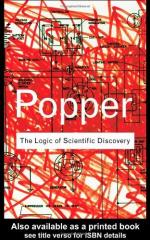|
This section contains 750 words (approx. 2 pages at 400 words per page) |

|
Part II: Chapter 5, The Problem of Empirical Basis Summary and Analysis
Singular statements are important to Popper's argument for a logic of science. In this chapter, he considers the kind of singular statements that are also basic statements. Basic statements allow for considerations of whether or not a theory is falsifiable (empirical) and for corroborating falsifiable hypotheses. Popper investigates the chain of logical reasoning by breaking the process up into many small steps. He claims that these steps are easily checked by those with mathematical or scientific expertise. He suspends judgment if proof cannot be found, but does not deny existence if proof is not evident in tests. If a problem is not testable, then, Popper says that the best contribution such a statement can make is to suggest a problem.
Popper rejects perceptions as the basis of...
(read more from the Part II: Chapter 5, The Problem of Empirical Basis Summary)
|
This section contains 750 words (approx. 2 pages at 400 words per page) |

|




